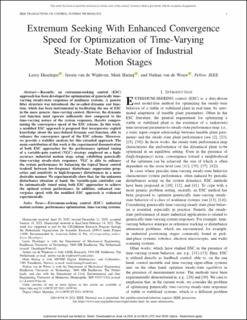| dc.description.abstract | Recently, an extremum-seeking control (ESC) approach has been developed for optimization of generically time-varying steady-state responses of nonlinear systems. A generic filter structure was introduced, the so-called dynamic cost function, which has been instrumental in facilitating the use of ESC in the more generic, time-varying context. However, the dynamic cost function must operate sufficiently slow compared to the time-varying nature of the system responses, thereby compromising the convergence speed of the ESC scheme. In this work, a modified ESC approach is proposed that incorporates explicit knowledge about the user-defined dynamic cost function, able to enhance the convergence speed of the ESC scheme. Moreover, we provide a stability analysis for this extended approach. The main contribution of this work is the experimental demonstration of both ESC approaches for the performance optimal tuning of a variable-gain control (VGC) strategy employed on a high-accuracy industrial motion stage setup, exhibiting generically time-varying steady-state responses. VGC is able to enhance the system performance by balancing the typical linear control tradeoff between low-frequency disturbance suppression properties and sensitivity to high-frequency disturbances in a more desirable manner. We experimentally show that, for the unknown disturbance situation at hand, the variable-gain controller can be automatically tuned using both ESC approaches to achieve the optimal system performance. In addition, enhanced convergence speed with the modified ESC approach is evidenced experimentally. | en_US |
